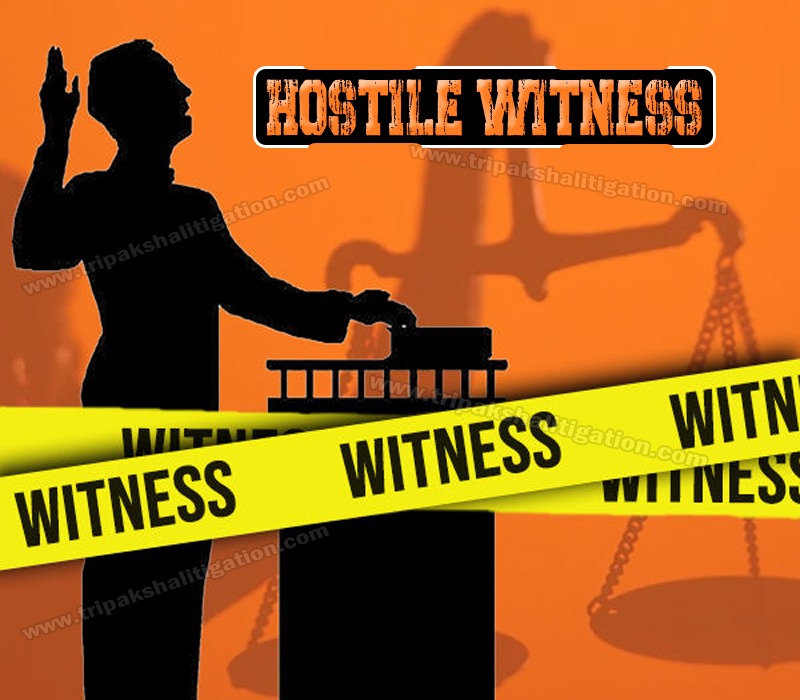INTRODUCTION:
“Witnesses” Bentham said: “are the eyes and ears of justice. If the witness himself is incapacitated from acting as eyes and ears of justice, the trial gets putrefied and paralyzed, and it no longer can constitute a fair trial”
However on many occasions, the witness gives a certain statement or his knowledge about commission of a crime before the police but refutes it when called as witness before the court during trial. Such a witness is termed a hostile because it affects the direction of the case.
Whether it’s a case of Best Bakery case, Jessica Lal or Phoolan Devi Case it has been found in most of the high profile and even in normal cases also, eye witness of the Case become hostile during trial of the case which not only make the prosecution case weak but grave in justice to the victim also. In a country like India, where there is no law and scheme for the protection of witnesses, in such situation judiciary has become puppet for the rich people. Even there is no provision of recording statement in oath and signed by the witness during investigation under Section 161 of Criminal Procedure Code by the investigating officer. And that is why witness after recording statement under section 161 Cr.P.C, become hostile during trial which is another impact in the process of prosecution because as per Section 193 only those person will get punished who after taking oath give false evidence before court. Thus, it is simple to say that witness who gave statement before Police and then turned hostile in court does not get any punishment. Many times it has been found that, the investigation officer did their best to collect evidence against the accused but due to some lapses and lack of provision for the protection of the Witness, the accused get benefit from it and make fun of the judiciary as well as the executive (Police department) which not only create a negative impact in the society but also people don’t want to come forward to give statement in cases due to their life risk and harassment faced by themselves by the investigation and prosecution agencies.
HOSTILE WITNESS:
Indian law does not define a “Hostile witness”. Hostile witness means when a witness gives statement before police officer regarding an offence and then refutes from his statement before court. Indian law fails to define Hostile witness in any of its law whether its Cr.P.C or Evidence Act. The term hostile witness mean advance or unfavorable witnesses are aliens to the Indian evidence act
The term “hostile witness has hostile has its genesis in the common law”. The word hostile has to be interpreted in comprehensive manner. The function of the word hostile under common law was to provide safe guard against the contrivance of an artful witness who willfully by hostile evidence ruin the cause of party falling such witness. Common law laid down certain peculiarities of a hostile witness such as not desirous of telling the truth at instance of party calling him or the instance of a hostile animus to the party calling such a witness. Indian law also derives the meaning of hostile witness from the common law.
The term hostile witness was first introduced in the common law to provide adequate safeguard against the “contrivance of an awful witness” who willfully by hostile evidence “ruin the cause” of the party calling such a witness. Such actions hamper not only the interest of the litigant parties but also the quest of the courts to meet the end of justice. The “safeguard” as envisaged under the common law consisted of contradicting witness with their previous statements or impeaching their credit (which normally as rule was not allowed) by the party calling such witness. To initiate the safeguard, it was imperative to declare such a witness “hostile”. For this purpose, common law, laid down certain peculiarities of a hostile witness, such as, “not desirous of telling the truth at the instance of the party calling him” or “the evidence of a hostile animus to the party calling such witness.”
A witness cannot be treated as hostile merely because his evidence is favorable to the other side and the fact that the witness has become hostile has to be established by eliciting information as could give an indication of hostility. A hostile witness may be defined as one who from the manner in which he gives evidence (within which is included the fact that he is willing to go back upon previous statements made by him), show that he is not desirous of telling the truth to the court where therefore one comes across a witness of this description. There is very high authority for proposition that the evidence of such witness cannot be part be relied upon and the rest of its discarded or rejected.
Though, a witness who states the truth cannot be dubbed as hostile just because his statement doesn’t suit the party producing him. A witness who is gained over by the opposite party is hostile witness.
It is observed: adverse means hostile i.e. when in the opinion of the judge he bears a hostile animus to the party calling him and so does not give his evidence fairly and with a desire to tell the truth to the court. An “adverse witness in a trial who is found by the judge to be hostile (adverse) to the position of the party whose attorney is questioning” the witness, even though attorney called the witness to testify on behalf of his client. When the attorney calling the witness finds that the answers are contrary to the legal position of his client or the witness becomes openly antagonistic, the attorney may request the Judge to declare the witness to be hostile or adverse. If the Judge declares the witness to be hostile the attorney may ask leading questions which suggest answers or are challenging to the testimony just as on cross-examination of a witness who has testified for the opposition. Hostile witness is a witness who testifies for the opposition party or a witness who offers adverse testimony to the calling party during direct examination.
In the judgement of Gura Singh Vs. State of Rajasthan AIR 2001 SC 330.
The term hostile witness mean advance or unfavorable witness are aliens to the Indian Evidence Act. These all are terms of English law a hostile witness is described as one who is not desirous of telling the truth at the instance of party calling him and unfavorable witness is one called by the party to prove a particular fact or issue a relevance to the issue who acts to prove such fact or proves the opposite test.
The domestic law differs to a significant degree in this respect firstly the provision of section 154 of Indian Evidence Act 1872, only talks about permitting “such questions as may be asked in cross examination”, secondly the law mentioned the, need to declare a witness as hostile before the previsions can be invoked.
In Sat Paul Vs. Delhi Administration
An officer was charged with taking bribe a trap was laid by an inspector of the Anti-corruption Department. The office of the accused was raided immediately after the money was supposed to have been passed to him. The evidence of the witness who participated in the trap, as also that of the inspection was rejected because they were interested in the success of their trap. Two other witnesses who were supposed to be independent made contradictory statements and the prosecution itself had cross-examined them with the permission of the court. The question of the value of their evidence arose. The court said a hostile witness is described as one who is not desirous of telling the truth at the instance of party calling him and an unfavorable witness is one called by a party to prove a particular fact who fails to prove such fact or proves an opposite fact.
The question which comes to our mind is that why do witnesses turn hostile?
RUDIMENTS RESPONSIBLE FOR TURNING A WITNESS HOSTILE:
There are a number of reasons for witnesses to turn hostile. The major reason is the absence of police protection during and after the trial. Consequently, the witness faces the wrath, intimidation, threat (as noted by the Delhi High Court) or inducement from the aides of the convicts who may be well connected. Other rudiments responsible for hostile witnesses are as following:
- Disinclination to get involved with court proceedings.
- Fear of criminals or hooligans. A witness turning hostile is either due to allurement or threats to witnesses. Commonly, threats play a vital part in forcing a witness to retreat from his statements. This is also reflects our criminal justice system and how it treats victims and witnesses.
- Sympathetic attitude towards accused.
- Lack of civilized sense in the public.
- High rate of bribe and corruption has been observed that while offenders have range of rights (both constitutional and legal). The victim and more particularly witnesses have a limited range privileges and protection accorded to them through the judicial or discretions of the judges.
- Categorization of witness is an important procedural requirement in the witness protection mechanism. The two primary purposes: categorization sacks to serve are:
- To identify those witness who have the proclivity to term hostile out of fear of intimidation because of
- Nature of crime – terrorism/drug related crime, victims of riot/organized crime etc. in these cases the witness becomes hostile.
- To use those witnesses, who turn hostile to weaken the prosecution’s case by helping the accused.
- To identify those witness who have the proclivity to term hostile out of fear of intimidation because of
- Inherent vulnerability (owing to the personal characteristic of the witness) of the witness women, children (especially in case of sexual offences e.g. Rape cases) in these cases witness turn hostile.
In Priyadarshni Mattoo rape and murder case. In this Priyadarshni Mattoo was raped and murdered at her Delhi residence by Santosh Kumar Singh who had been stalking her for over a year. The lower court acquitted Santosh Singh on the ground that the CBI failed to prove its case beyond reasonable doubt. But after long 10 years he was convicted by High Court.
- Non-implementation of penal laws. Like section 191,192 and 193 of IPC.
- Observation of the Delhi High Court that witnesses in a large number of cases were turning hostile due to intimidation and threats.
- Threats of retaliation and actual physical violence intimidate many victims and witnesses into not co-operating criminal proceedings
- If the person or witnesses are poor or disadvantaged by caste, community or gender, they may instead be victims of grave threat and intimidation. It is routine practice, for instance in cases of Delhi atrocities, for police to register criminal complaints against Dalit victims and witness as well they are then coerced to change their statement to escape criminal prosecution in rigged cases and socio-economic boycott in their villages. This is also the main reason that they cannot give real statement and become hostile witness.
The Supreme Court also observed that, “A witness is not treated with respect in the Court… He waits for the whole day and then finds the matter adjourned… And when he does appear, he is subjected to unchecked examination and cross-examination and finds himself in a hapless situation”. In Jessica Lal case is a well known instance where 32 prosecution witnesses turned hostile due to threats from the accused side resulting into acquittals of the accused. Even the Judge of Priyadarshini Mattoo rape and murder case during the judgment said that “Though I know he is the man who committed the crime, I acquit him, giving the benefit of doubt”. There are so many examples which show that there is a need of protection of witness for fair justice.
CONCLUSION:
It seems to us that having regard to the fluctuation of views on the subject it is desirable to restate the position in positive terms section 154, the point being one of among nature and practical importance. Both logic and common sense require that there should be no bar of against a party relying on the evidence of a hostile witness. Circumstances of the case may throughout on the veracity of entire evidence. But there should be no general prohibition. A witness is not necessarily hostile if in speaking the truth he knows and sees it, his testimony happens to go against the party calling him. There is no proposition in the law of evidence that a witness who is not party or partisan in favor of the party calling him is on that ground alone to be treated as hostile. Just what conclusion the court will arrive at after weighing the impact the course of justice delivery mechanism but unduly the proceedings by itself held tremendous significance. The IPC already suggests intolerance for false statement made during the course of a trial substantiated by the prescription of a sentence of even 7 years for anyone convicted of the same. Yet, this law is rarely but to use. The perjury charges initiated against witness is a high profile case like that of Jessica lal will hopefully act as a precedent that will not be lost.
It is a fact that criminal trials in India suffer largely on account of witness retracting statements made to the police officials in the early stages of investigations. Money power and threats have been seen too of them to influents important witness, even to the extent of them variegating evidence. As in the Zaheera Sheikhs’s case, where she received a year imprisonment for repeatedly retracting her statements in the Best Backery case. Since, witnesses offer vital evidence based on which juridical decisions are taken, it is important that courts immediately pate halt to what is but a complete mockery of judicial proceedings. It is high time to bring law for the protection of the witness as well as amendment should be done in Cr.P.C and to initiate deterrent actions and being to strictly enforce laws related to perjury and false evidence.
You may contact me for consultation or advice by visiting Contact Us








